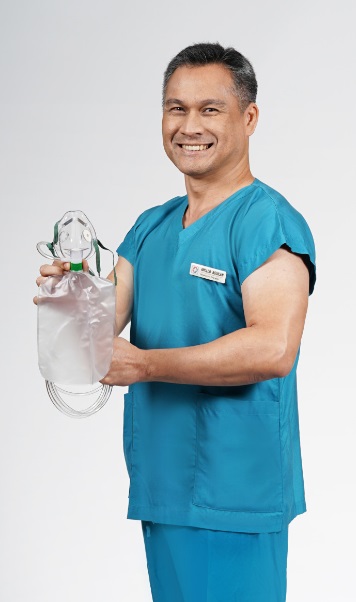
Allied Health Professionals play vital roles in the different aspects of investigative work and therapeutic care for patients. As important members of the multidisciplinary healthcare team, they work alongside doctors and nurses to provide holistic and high quality healthcare.
SingHealth's Allied Health Professionals are experts in their fields of practice. From diagnosis to treatment and rehabilitation, they are empowered to make independent assessment and decisions on the care for patients.
Career Tracks

As a SingHealth Allied Health Professional, you will be nurtured holistically through on-the-job training, mentorship and job rotations. You will be exposed to a wide variety of clinical specialties and opportunities for training and development. Depending on your aspirations, qualifications and strengths, you can choose to develop a clinical specialisation, undertake research, participate in education or move into management roles as you progress in your career.
Considering a career in Allied Health? Step into the shoes of an Allied Health Professional (AHP) and experience it firsthand through a voluntary job shadowing opportunity with us!
This opportunity is ideal for students and mid-career individuals looking for a fulfilling career in healthcare.
If you are keen, please fill up via this interest form.
For more information, you may refer to the different Allied Health disciplines below.

Audiologists provide care in the prevention, identification, diagnosis, and evidence-based treatment of hearing, balance, and other auditory disorders for people of all ages. They work with patients to minimise the negative impact of these disorders and achieve improved health outcomes and quality of life.

Art Therapists leverage the creative process of making art to improve patients’ physical, mental, and emotional well-being. Art therapy can help to promote personal development, improve coping skills and enhance cognitive functions.
Child Life Therapists provide therapeutic play and support for hospitalised children. They empower young patients with coping skills and are advocates for the rights of the child and his/her family.

Dietitians provide medical nutrition therapy to patients, which includes evidence-based diets, nutrition education and counselling, as well as nutritional supplements, enteral tube feeding and parenteral nutrition. They also conduct nutrition assessment and design nutrition care plans for patients.
Imaging Technologists/Sonographers perform ultrasound examinations and produce high quality ultrasonic imagery for clinicians to diagnose and formulate care plans for patients.

Medical/Laboratory Technologists conduct a wide array of diagnostic laboratory tests to analyse, detect and identify diseases or disease-causing microbes for the diagnoses of patient conditions and diseases.
Medical Physicists estimate the absorbed dose and dose equivalence of patients undergoing radiological examination, and are responsible for investigating radiation exposure to staff and patients.

Medical Social Workers provide psychosocial care and support to patients and their families through interventions such as psychotherapy, supportive counselling, grief counselling, financial assistance, and linking them up to relevant community resources and support.

Music therapy can address physical, behavioural, emotional as well as psychological needs. Music Therapists use clinical evidence-based music interventions to build therapeutic relationships with patients and provide a conducive environment for them to overcome their problems.

Occupational therapy plays a crucial role in ensuring that patients regain their independence in the activities of daily living, self-care, employment and leisure. Occupational therapists care for patients of all ages and conditions, and use a variety of treatment approaches to cater to different individuals’ needs.

Optometrists provide an accurate measurement of any refractive anomalies and delivers quality vision care to complement doctors’ care for patients. They also perform optometric-related duties such as contact lens fitting, primary eye care and low vision counselling on proper eye wear when required.

Oral Health Therapists advocate the importance of oral health care. They are responsible for maintaining patients’ oral health and prescribing preventive methods for oral diseases.

Orthopists assess the misalignment of the eyes (squints) and assists in the diagnosis of eye muscle disorders. They are also involved in the management of Amblyopia (lazy eyes) and accommodation and convergence deficiencies (difficulties focusing), and the recommendation of orthoptic intervention management plans.

Perfusionists play an important role in cardiac surgeries – they manage the perfusion of cardiopulmonary bypass cases, operate and maintain heart-lung machines, blood analysis equipment and other accessory equipment to ensure safe surgeries. Outside of the operating theatre, they provide extended support to manage patients’ circulatory functions.

Pharmactists optimise drug therapy for patients through the review of indications, dosages, drug interactions, side effects, cost and possible non-compliance of medication. They work in both general and specialty clinical areas including Oncology, Infectious Disease, Cardiology, Geriatrics, Critical Care, Paediatrics and Transplantation.

Physiotherapists manage a wide range of conditions, including patients with physical disabilities or musculoskeletal, neurological and cardiopulmonary conditions. They help patients optimise their mobility after an injury, surgery or illness by prescribing safe and evidence-based exercises to improve their functional capacity, joint mobility and balance, build muscle strength and relieve pain.

Podiatrists diagnose and treat conditions in the legs and feet, including wound management, toenail pathologies, ingrown toe nails, skin lesions, deformities, biomechanical problems and development problems in children’s feet.

Psychologists assess patients’ mental state, emotional wellbeing, and psychological functioning. They use therapy to help patients cope with their medical or psychological condition to improve general functioning and psychological wellbeing.

Radiation Therapists are integral members of the cancer care team who treat and manage cancer patients, and provide care and support to them throughout their radiation treatment.

Radiographers perform radiographic procedures independently to produce diagnostic quality images for radiological interpretation to help diagnose or treat patients’ conditions.

Respiratory Therapists are experts in managing airways and accessing the vascular system. They assist with the management of artificial airways and help patients, especially those on ventilators, to breathe better by monitoring their breathing. They also work to provide relief to patients who have cardiopulmonary, sleep disorders and neuromuscular problems.

Speech Therapists assess and manage swallowing and communication disorders in adults and/or children. Communication disorders include disorders in speech, language, fluency and voice.



















